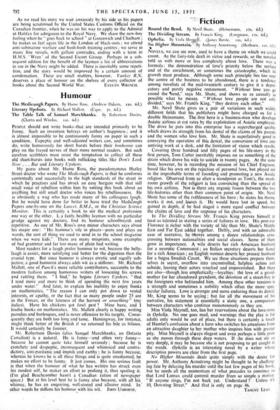Humour
PEOPLE should not write books-that are intended primarily to be funny. Such an invention betrays an author's happiness ; and it is almost impossible to be continuously funny on paper in such a condition. Eupeptic and well-adjusted writers can, and sometimes do, write humorously for short bursts before their bonhomie can play on the frayed nerves of their more normal readers. But such carefree scribblers must resist the temptation to collect all these old short-bursts into books with rollicking titles like Don't Look Now . . . But and Literary Upshots.
My guess about Mr. Hume Ross, the pseudonymous Harley Street doctor who wrote The Medicough Papers, is that he conforms contentedly and successfully to the high standards of the street in which he practises and has struck an easy bargain with that still small voice of rebellion within him by writing this book about an anything but still small doctor who voices his rebelliousness. He is obviously a wag who has made many of his colleagues laugh. But he would have done far better to have tried the Medicough Papers one-by-one on the Lancet, B.M.J., or the Christian Science Monitor. This is certainly a book to stir the medical profession one way or the other. 1, a fairly healthy layman with no particular grudge against my doctors, find its humour schoolboyish and repetitive. As one of Mr. Ross's own minor characters says about his major one: " His humour's vile in places—puns and plays on words, the sort of thing we used to send in to the school magazine when we were kids." There are many misprints. some examples of bad grammar and far too many of plain bad writing.
Most readers for a laugh prefer humour to wit, because the belly- laugh is easier, more satisfying and better for the digestion than the cranial type. But since humour is always erratic and usnally sub- jective. a good humorist always adds wit as a stiffener. Mr. Richard Mallett, one of Punch's more reliable contributors, succumbs to the modern fashion among humorous writers of loosening his screws and rattling them. "1 find," he begins Literary Upshots, " that I tend more and more to think of spending the next few years under water." And later, to explain his inability to enjoy books on mathematics, " The reason I can only put down to vested interests, or apathy, or the fact that so many people under 25 are in the Forces, or the lateness of the harvest or something" (my italics). Have his chickens got fowl pest ? Mine have, and I loathe books on mathematics. Mr. Mallett clearly is happy writing parodies and burlesques, and is never offensive to his targets. Conse- quently they are both too long and tame. Hemingway, for instance, might think better of the British if we returned his bile as bilious. It would certainly be funnier.
Mr. Robertson Davies (alias Samuel Marchbanks, an Ontario Canadian) is a natural. He is funny—and often very funny— because he cannot quite take himself seriously ; because he is crotchety and dyspeptic, inconsequent and whimsical and contra- dictory, anti-puritanic and impish and earthy ; he is funny because. whereas he knows he is all these things and is quite unashamed, he makes no effort to be funny. It just comes. His one serious fault is that when the humour of what he has written has struck even his modest self, he inaket an effort to prolong it, thus spoiling it. (I'm glad Beachcomber hasn't a Canadian ration of newspaper space.) But at his level best he is funny also because, with all his whimsy, he has an enquiring, well-stored and allusive mind. In' other words he stiffens his humour with his wit. JOHN USBORNE.


































 Previous page
Previous page